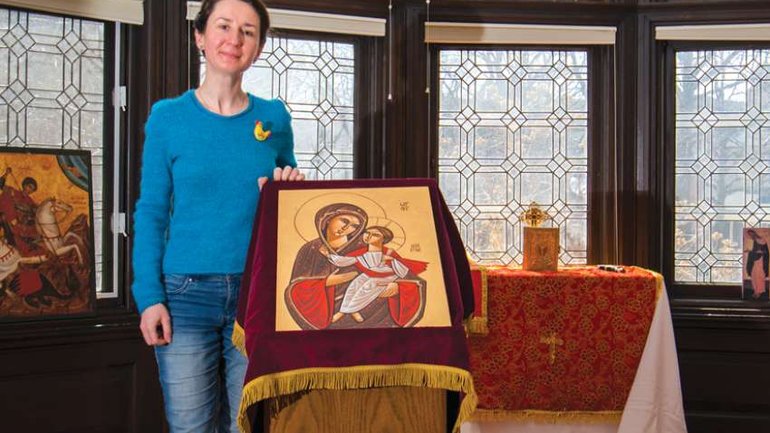Crossing Ukraine’s threshold of hope

By Michael Swan
“Hope is my leading star now,” she told The Catholic Register on the eighth day of the Russian assault.
Ivaniv is alone in Canada, working towards a PhD at the Sheptytsky Institute — part of the University of St. Michael’s College and the Toronto School of Theology. The 30-year-old scholar, who has studied at the Ukrainian Catholic University in Lviv and at the Catholic University of Louvain in Belgium, is researching the reception of the Second Vatican Council in the Ukrainian Greek Catholic Church. She hopes to have her thesis written and accepted within a year.
But writing a thesis proposal, searching archives and the life of a young scholar in general has all ground to a halt under the Russian assault on her homeland.
“I’m trying to put everything in my heart and in my head together,” she said. “There are too many emotions. But at the same time, as a theologian, I have to find ways for myself to cope with that, trying to find perspective. … It’s the eighth day of war and all I can do is pray.”
News of the Russian invasion broke in the middle of the night in Ukraine. Ivaniv knew before her family did that troops were crossing the border, even though they live between Liviv and Ivano-Frankove in Western Ukraine. Ivaniv waited until it was 7 a.m. in Ukraine before calling them.
“It was terrible to call my father, to call my sister — to tell them something bad is happening.” she said.
Ivaniv has friends who have been trapped in basements for days on end and feels that spiritually she’s there with them.
“Ukrainians really now feel ourselves like one body, one united people,” she said.
She’s been talking to Ukrainians in Canada and the United States about how they can make a positive contribution. “How can we multiply these prayers?” she asks. “They’re bombing cities 24-7 the last few days. We have this fear. But hope is even bigger.”
From the perspective of her theological research, Ivaniv finds Moscow Patriarch Kirill’s rhetoric of nationalism fused with a particular image of the Church disturbing and dangerous.
“Evil has shown its face,” she said. “Evil that is growing and putting on the mask of Orthodoxy should be destroyed.”
On Armed Forces Day, the eve of the Russian invasion, the head of the largest and richest church in Orthodoxy gave a nationalistic speech to soldiers, urging the Russian military to “choose the right path.”
“Our servicemen must have no doubts that they’ve chosen a rightful path in their lives. By following this path, you are protecting the people even without any military action. The strength of the Armed Forces, the strength of the Russian army — this is already a weapon that protects our people,” Kirill said.
Cheerleading for the war is part and parcel of the Moscow Patriarch’s accusation that the majority of Orthodox Ukrainians have created a schism by choosing to become a self-governing church aligned with the Ecumenical Patriarch Bartholemew.
“Christianity is not about schism and who is with us and who is against us,” said Ivaniv. “Christianity is about the truth first of all, and following Christ — not following money and power.”
But the danger isn’t all on the Russian side. Fusing nationalism with faith has been a problem even in the Ukrainian Greek Catholic Church, Ivaniv said. Through the Cold War, many in the diaspora nursed resentment and anger toward the Soviets, inspired by the repression of the Catholic Church in Ukraine.
“That’s a big problem for our Church,” said Ivaniv. “Because sometimes people are coming to church just because of national questions, not because of religious questions. The challenge is that we have to help people, but still you have to say in what you believe.”
At rallies across Canada in support of Ukraine, red and black banners of the Ukrainian Insurgent Army have been spotted. Known by the Ukrainian acronym UPA, the organization has roots in a Nazi SS brigade which carried out ethnic cleansing against Poles and helped the Germans with genocide. The UPA has long been active in Canada.
In the face of this brand of violent nationalism, the Church’s job is to lead people back to Christian, Gospel values, said Bishop Bryan Bayda, Ukrainian Catholic Eparchy of Toronto and Eastern Canada administrator.
“The Church must be recognized for what it stands for based on its history, and not confused with those who may wish to stand next to it with an ulterior motive,” Bayda said in an e-mail. “We prefer to speak for something, to speak for Christian values as handed down to us by the Church and found in Scripture.”
It’s a tough time to challenge nationalism in the Church, “because it’s so alive, this wound, now,” said Ivaniv.
“We as theologians, as a theologian who is researching in ecclesiology, will find a way to help realize and find a way to figure out how to manage all these emotions,” she said.
Now more than ever, theologians have to leave their libraries and their classrooms to speak with ordinary, faithful Catholics, she said. Theologians must “help lay people see who they are,” she said.









